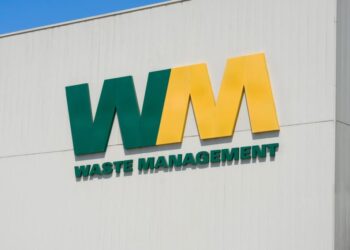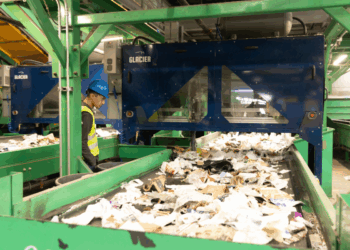Some of the technology world’s big names are funding an electronics collection effort in Denver, trying to boost recycling rates.
Google, Apple, Amazon, Dell Technologies and Microsoft launched an electronics collection pilot program in Denver, with doorstep collection service Retrievr in charge of managing the project.
Retrievr CEO Kabira Stokes said the pilot has two goals: to see how much Retrievr can improve Denver’s electronics recycling rate and to change the way people think about recycling.
“It’s really a paradigm shift in the way people think about electronics recycling,” she said. “It seems out of reach and hard. We can make it easy.”
In 2020, about 13,800 tons of electronics were recycled in Colorado, according to a state report. That amount has been declining each year from a 2015 high of 23,800 tons. Overall in 2020, Colorado diverted 15.3% of its municipal solid waste from the landfill, missing its goal of 28%.
“Having this service launch in Denver is a great way to give our residents a new way to recycle their old electronics all while boosting our city’s diversion rate,” Denver Mayor Michael Hancock stated in a press release. “Recycling is an easy but critical action we all can take to reverse the effects of climate change and lower our greenhouse gas emissions, and I encourage everyone in Denver to take advantage of this new service.”
Stokes said her company was approached by the consortium of brands about 18 months ago.
“They had come together on their own and understood and all agreed the only way to move residential electronics recycling rates forward is to go to their doors and to make it as convenient as it is to recycle paper, bottles and cans,” she said.
The brands and Retrievr worked to select a city, eventually landing on Denver because of the strong environment ethos but low recycling rates, Stokes said.
To schedule a pick-up with Retrievr, customers visit the website, select what items they want to recycle and schedule a date for the pick-up. Normally there’s a $20 fee for doorstep service and then an additional fee of $30 or more for items with screens, such as TVs and monitors, but in Denver the brand owners are covering those fees to start.
Stokes said there’s no set time on how long the companies will subsidize the fees, because it depends on how many people use the service.
Retrievr is an e-Stewards Enterprise, so the company promises every electronic device it collects will be processed through a secure chain of custody and that the data removal process complies with NIST data destruction guidelines.
Stokes said Retrievr also tries to “keep it as local as possible for as long as we can,” so it contracted with a local e-Stewards-certified collector to do the collection in Denver.
She declined to share the cost of the pilot and said much of the cost also depends on participation.
“Is it worth it to spend the initial spend to get people to participate? We’ll learn a lot over the next year,” she said.
Overcoming recycling barriers
Before the pilot project, Retrievr was serving a million homes in the Philadelphia area with doorstep pick-up of textiles and electronics. Investment firm Closed Loop Partners invested in Retrievr in early 2017, as it was starting up under the name Curb My Clutter.
With the Denver pilot, Stokes said the group is trying to identify all the barriers someone might face in recycling electronics. Nostalgia for old items, lack of convenience, fear around data security and cost are a few, she said.
“Convenience, that one is obvious. We’re coming to your door,” she said. “And the cost piece the brands are trying to subsidize that away for a little while. As the pilot goes on over the next year we’ll look at the various barriers and the best ways to overcome them.”
Retrievr is also thinking about how to bring electronics recycling to communities where no program infrastructure exists. Stokes said the company also has specific cities in mind for expansion in the future, though the brands are currently only investing in Denver.
A vital part of a truly circular economy is getting all partners to the table, Stokes said, which is what Retrievr aims to do.
“This is our first foray into big brand partnerships like this and we’re very excited to see what these companies putting their marketing might and voice and power behind us can do,” she said.
By working with brands that produce items and the customers who buy them, Stokes said “we expand the field of vision” to encourage recycling at the point of sale.
“We’re looking at the broader, more holistic circular infrastructure,” she said. “Everyone will have to be at the table: the customer, the manufacturer, the reseller, the collector and recycler and the re-manufacturer, as they emerge.”
A version of this story appeared in E-Scrap News on March 3.
































